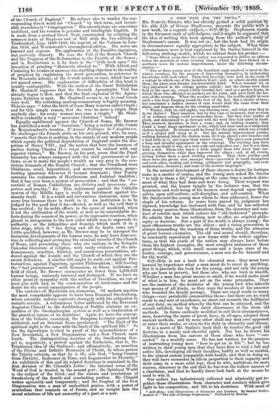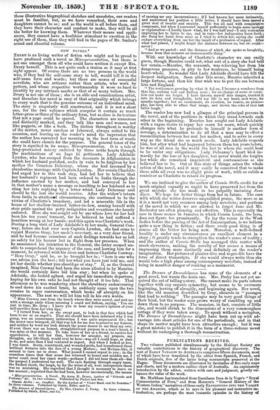A GOOD BOOK FOR mt TOT - NG. * Mn. SAMUEL 13narzs, who
has already gained a solid position. by his able Lffe of George Stephenson, presents the publk 'ORR p. new work, on a cognate subject,—&J'-Help. Stephenson stands in the foremost rank of self-helpers, and it might be supposed that the idea of writing this book sprang from the author's studynf Stephenson's career. It was not so ; but the book had its origin in circumstances equally appropriate to the subject. What those circumstances were is best explained by Mr. Smiles himself in the following striking sketch, which we extract from his preface :— " Some fifteen years since the author was requested to deliver an address before the members of some evening classes, which had been formed in a northern town for mutual improvement, under the following circum- stances :—
"Two or three young men of the humblest rank resolved to meet hi the winter evenings, for the purpose of improving themselves by exchanging knowledge with each other. Their first meetings were held in the room of a cottage in which one of the members lived ; and, as others shortly joined them, the place soon became inconveniently filled. When summer set in they adjourned to the cottage garden outside ; and the classes were then held in the open air, round a little boarded hut, used as a garden-house, in which those who officiated as teachers set the sums, and gave forth the les- sons of the evening. When the weather was fine, the youths might be seen until a late hour hanging round the door of the hut, like a cluster of bees ; but sometimes a sudden shower of rain would dash the sums from their slates, and disperse them for the evening unsatisfied.
"Winter, with its cold nights, was drawing near, and what were they to do for shelter ? Their numbers had by this time so increased, that no room of an ordinary cottage could accommodate them. But they were youths of pluck, and determined to go forward with the work they had taken in hand. They resolved, therefore to hire a room ; and, on making inquiry, they found a large dingy apartment to let, which had been used as a temporary cholera hospital. No tenant could be found for the place, which was avoided as if a plague still clung to it. But the mutual improvement youths, nothing daunted, hired the cholera room, lit it up, placed a few benches and a deal table in it, and began their winter classes. The place soon presented a busy and cheerful appearance in the evenings. The teaching may have been' as no doubt it was, of a very rude and imperfect sort ; but it was done with a will. Those who knew a little taught those who knew less—im- proving themselves while they improved the others ; and, at all events, setting before them a good working example. Thus these youths—and there were also grown men amongst them—proceeded to teach themselves and each other, reading and writing, arithmetic and geography, and even mathematics, chemistry, and some of the modern languages."
In the natural development of these classes a desire for lectures came as a matter of course, and the young men asked Mr. Smiles "to talk to them a bit," making at the same time a modest state- ment of what they had done and were doing. Their request was granted, and the lesson taught by the lecturer was, that the happiness and well-being of his hearers must depend upon them- selves, upon self-culture, self-discipline, and. self-control. What Mr. Smiles told the young men whom he then addressed, forms the staple of his volume. As years have passed by, judgment has ripened, knowledge has increased with him, and he has collected from many sources those illustrations from the character and con- duct of notable men which enforce his "old-fashioned" precepts. He admits that he has nothing new to offer' no original philo- sophy or doctrine. But a part of the world is always young ; the most efficacious truths are the oldest ; and a rising generation is always demanding the teaching of those truths, and the stimulus of great human examples. The old and sound should, therefore, be constantly reproduced in new forms with the widest applica- tions, so that the youth of the nation may always have before them the highest examples, the most complete instances of those great things, which, with small means and a large store of in- dustry, courage, and perseverance, a man can do for himself and for the world.
Self-Help is not a book for educated men : they must have learned by experience what a man must do to excel in anything. But it is precisely the book for the young, and not only the young who are born in poverty, but those also who are born in wealth. Whether a man has great means or small, if he would make most of what is in him, he must act on the same principles. They are the masters of the destinies of the young lord who inherits vast means of all kinds, as they were the masters of his ancestor who founded the family peerage. There are royal roads to many things—very perishable commodities these—but there are no royal roads to any sort of excellence, no short cut towards the fulfilment of any duty, no method whereby the first can be attained, and the second satisfied, but by the strict observance of the stern _old methods. In forms endlessly modified to suit their circumstances, men, deserving the name of great, have, in all ages, adopted these ancient methods, and by none other shall any man ever approach or enter their ranks, or even do his duty in obscurity and silence. It is a merit of Mr. Smiles's book that he teaches the good old doctrine in a manly and cheerful spirit. Nor has he drawn his illustrations from the careers of those alone who have " suc- ceeded " in a worldly sense. He has not written for the purpose of instructing young men " how to get on in life".' but he has written to show young men that they have first to lead a full and active life, devoloping all their faculties, bodily as well as mental, to the utmost extent compatible with health, and that in doing so, they will have succeeded MI life in proportion ta their capacity and their aims, in a more solid way, than he who ambitions for mere success, discovers in the end that he has won who, hollow success of a charlatan, and that he hardly dares look back at the means he used to win it.
Our author has industriously collected and admirably put to- gether those illustrations from character and conduct which give light to his composition, and life to his doctrines. With most of
• &1f-Help; with Illustrations of Character and Conduct. By Samuel Smiles, Author of " The Lite of George Stephenson." Published by Murray.
these illustrative biographical sketches and anecdotes, our readers must be familiar, but, as we have remarked, their sons and daughters cannot be so ; and as the world is all before them, and they have their character and conduct to make, they will be all the bettor for knowing them. Whatever their means and appli- ances, they cannot have a healthier stimulant to exertion in the right use of them, than they will find in the pages of Mr. Smiles's sound and cheerful volume.



























 Previous page
Previous page